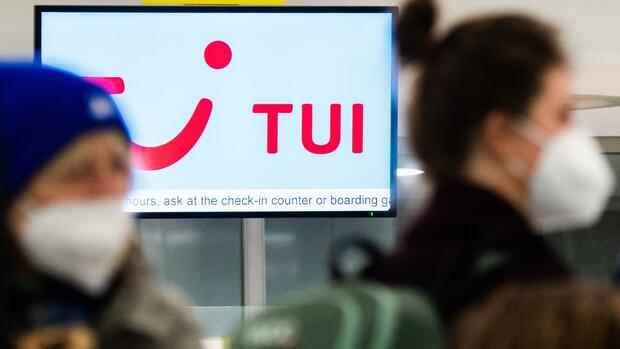Frankfurt Exploding numbers of infections, the Omikron virus variant, new travel restrictions – nobody in the travel industry knows how hard this winter will actually be. At the same time, Friedrich Joussen does not want to be deprived of his confidence. “I can not imagine that 2022 will be worse than 2021,” said the CEO of Tui on Wednesday morning. Bookings for Easter, for example, are almost back to pre-crisis levels. “And at higher prices.”
Joussen tried again and again to justify his optimism. In the fourth quarter of the staggered financial year 2021 (until the end of September), the group’s hotels were already back in the black. This also applies to the markets in Central and Western Europe. “In the fourth quarter we only offered about half of the normal capacity, yet the free cash flow was 1.4 billion euros. That’s impressive, ”said the top manager for his positive view of the coming year.
But the message didn’t want to get caught up in the stock market. The share of Europe’s largest travel company fell by a good 6.5 percent on Wednesday morning, then recovered quite quickly, but remained in the red. Investors had expected better numbers for the past year. Sales of 5.7 billion euros and a net loss of 2.3 billion euros – that was what the experts had forecast on average.
The result was a turnover of 4.7 billion euros and a loss of almost 2.5 billion euros – too little in the eyes of investors. Tui boss Joussen referred to other key figures. The company was able to reduce its net debt – from 6.4 to just under five billion euros. The company also has sufficient liquidity with EUR 3.5 billion. “Liquidity is no longer an issue, it’s debt and profitability,” said Joussen.
Top jobs of the day
Find the best jobs now and
be notified by email.
But a look at the 2021 balance sheet shows that the travel company still has a long way to go out of the crisis. In the months of October, November and December, around one billion euros in liquidity will flow out again. Only the capital increase a few weeks ago, which brought in around 1.1 billion euros, ensures that liquidity remains stable.
Equity remains negative
In addition, the situation on the equity side improved somewhat in the fourth quarter from minus 525 million euros in the first nine months to minus 418 million euros. But equity is still negative, and Joussen still has to fix this construction site as well.
The TUI boss sees good conditions for this, however: “I expect that we will be able to return to the pre-crisis level in the summer of 2022.” The occupancy rate in many countries would already be 80 percent. “Easter is the first important season, and here we are at 90 percent,” said Joussen. Tui could push through higher prices, this winter the plus would be 15 percent, in the coming summer even 23 percent.
Even Omikron has not been able to influence the bookings very much so far. “It is still too early for reliable statements, but we do not see a large wave of cancellations, rather people are postponing their bookings towards Easter, for example,” said Joussen. But that has no impact on sales and profitability.
Joussen could use solid business. He has to reduce various obligations that Tui had to enter into due to the crisis. The state development bank KfW and the federal economic stabilization fund had given guarantees totaling more than 4.3 billion euros. While Lufthansa has now repaid the state aid, that is still pending at Tui. Without a sustainable recovery, the top manager can neither pay back the aid nor pay off the debts and bring equity back into balance.
After the recent capital increase and statements about continued strong demand for travel, investors had recently seen Tui somewhat more positively. From the end of November to the publication of the annual figures on Wednesday morning, the share had risen by almost nine percent. The stock purchases by the entrepreneur Alexei Mordashov also created a certain amount of trust. Through his company Unifirm Limited, Mordashov is the largest single shareholder in Tui with over 30 percent of the share capital and not only participated in the capital increase, he also bought Tui shares for around 450 million euros in the last few weeks.
In addition, the rating agencies S&P and Moody’s have meanwhile increased their credit ratings for the company by one notch. But analysts urge caution. Whether Barclays Capital, Jefferies & Companies, Morgan Stanley or the Norddeutsche Landesbank, almost all larger houses assume that the Tui share will initially develop weaker than the industry.
Many analysts still do not trust the Tui management’s statement that the coming summer will almost be a normal travel season again. Especially since competitors and associations are assuming a later recovery.
However, hardly anyone doubts the fundamentally positive trend in the tourism industry. At the beginning of the week, the data service provider IPK International, which specializes in tourism, published the results of a current survey together with the ITB tourism fair. According to this, 80 percent of the participants surveyed around the world plan to travel abroad in the next twelve months.
Should it come to that, Tui, as the largest European travel group, could benefit from the pent-up demand. The company with around 70,000 employees is widely represented in the market with around 400 hotels, 18 cruise ships, 150 aircraft from the Group’s own airlines such as Tuifly and around 1,600 travel agencies. In crises like the current one, such “assets” are a burden on the balance sheet. But if a strong recovery sets in, such a broad portfolio can be advantageous.
More: Omikron variant arouses fear of another setback for aviation

